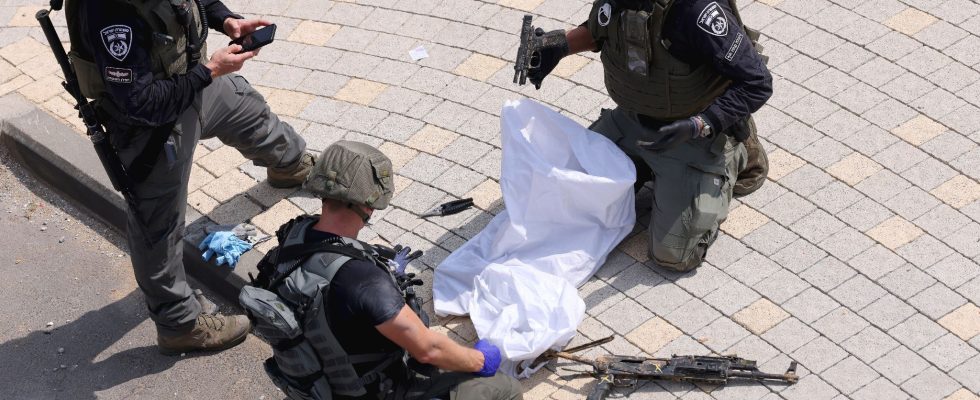From home, with her four little brothers and sisters, Naël heard everything about daily life in the Gaza Strip, on the other side of the wall. Its horns, its songs, its military training. “We knew they were training to kill us,” this young Israeli woman, who has not yet reached her twenties, tells us from Sderot, very close to Gaza. In front of her cell phone camera, she has to catch her breath to swallow back her sobs. Last Thursday, Naël had a bad feeling, which she was quick to share with her mother: “Everything became way too quiet, I felt like something was going to happen.”
Saturday October 7, at around 6:30 a.m., this silence was shattered with a deafening crash. Detonations “bring hell out of nowhere,” sighs Naël. Microlights fly over his home. Armed Hamas men arrived from all directions, on foot, by car, searched the surrounding houses and massacred 17 people in his neighborhood, including at least one child. Most of his neighbors only had knives to defend themselves. His father has a pistol: not enough to repel terrorists, but enough to reassure the siblings during the six interminable hours that the Hamas assault lasts, before the first Israeli soldiers arrive on the scene. “There were simply not enough soldiers,” says Naël. “They had to fight in other villages, outnumbered. I am not angry with our army, Israel will do what it takes to resolve the problem. If Gaza must be occupied, so be it!”
“Nothing less than an earthquake”
On October 7, Israel fell into a new tragic reality. The Jewish state, which can boast of having the most powerful army in the Middle East and the best informed intelligence, saw hundreds of Hamas terrorists surge from the Gaza Strip, without its soldiers being able to stop them. In a few hours, the armed organization, in power in Gaza since 2007, fired more than 2,000 rockets from its walls and seized around twenty villages on Israeli territory. Around a hundred civilians were taken hostage, forcibly brought back to the Gaza Strip and their abuses exhibited on social networks. “It is nothing less than an earthquake,” assures Kobi Michael, specialist in defense issues at the Institute for National Security Studies in Tel Aviv. “It is a huge failure on all levels, in intelligence, military and politics. The army was not capable of defending its citizens, that had never happened.”
However, this is not the time for reckoning on the Israeli side, but for armed struggle. For the first time since 1973 and the Yom Kippur War, the Jewish state is officially at war. This was neither the case in 1982 nor in 2006 during the conflicts in Lebanon, nor during the countless episodes of missile exchanges with Gaza over the last fifteen years. “Current events will have an enormous traumatic impact on the State of Israel, which will strongly influence its actions in the days, weeks, months and probably years to come,” explains Hugh Lovatt, Middle East specialist at the Council. European for international relations. This is a national crisis without parallel in the history of Israel. Even during the Yom Kippur War, which was seen as the country’s last existential moment, the battles took place in Egypt. We have not seen clashes of this magnitude on the streets of Israel since 1948.”
On Sunday evening, fighting between the Israeli army and Hamas was still taking place in 32 “infiltration points”, according to a military source. The objective remains to eliminate these fighters from Israeli territory as a priority before, undoubtedly, carrying out a major operation in the Gaza Strip. But the Israeli authorities are facing a complex and unprecedented question: that of the hostages. Hamas has forcibly returned more than 100 people to the Gaza Strip and is showing off its captures in online videos.
Israel, which agreed to release 1,000 Palestinian prisoners in exchange for Israeli soldier Gilad Shalit in 2011, faces an impossible equation. “The word nightmare is appropriate to describe the situation of the hostages, recognizes Lieutenant Masha Michelson, spokesperson for the Israeli army. The government has several options on the table, military intervention is one of these options, but this She’s not the only one.”
